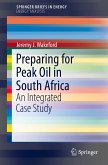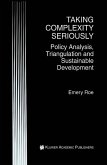Exposes the facts and implications of the most "inconvenient truth" in science Highlights the major social and economic impacts of the Peak of the Oil Age Provides an authoritative introduction in easy-to-understand language Featuresoriginal illustrations by one of Sweden's leading graphic artists, Olle Qvennerstedt
Dieser Download kann aus rechtlichen Gründen nur mit Rechnungsadresse in A, B, BG, CY, CZ, D, DK, EW, E, FIN, F, GR, HR, H, IRL, I, LT, L, LR, M, NL, PL, P, R, S, SLO, SK ausgeliefert werden.
"In his book, Peeking at Peak Oil physicist Kjell Aleklett explores the science and consequences behind the sobering reality that the world's oil production is entering terminal decline with no satisfactory alternatives. ... Using simple language and engaging illustrations, Aleklett's Peeking at Peak Oil leaves readers with a clear and comprehensive understanding of the emerging issue of our time." (Sustainable Guernsey, June, 2012)
"It is...refreshing to find a comprehensive, peak oil analysis that relies on rigorous scientific methods and empirical data rather than resorting to anecdotes, doomsday prophesies and red herrings....this book should be required reading for anyone seriously interested in the future world energy market and economy, especially politicians and policymakers....Aleklett's analysis is meticulous, his results are convincing, and the implications are sobering....The book also contains a wealth of information and can serve as a basic primer on global oil industry....This book has enough to interest both novices and oil industry veterans." (Roger H. Bezdek, World Oil, April 2012)
"In the book, Peeking at Peak Oil, that is released today in Uppsala, Aleklett summarises very thoroughly his ten years of work studying and trying to view the entirety of our oil-supply situation....In the book's rich collection of tables and figures Aleklett shows how companies, nations and even international energy organisations such as the OECD-based IEA have - intentionally or otherwise - made erroneous assessments." (Kersti Kollberg, Energy Bulletin, 11 June 2012, http://energybulletin.net/stories/2012-06-12/oil-and-future-thorough-work)
"The book factually shows that although fossil fuel consumption in industrial countries has somewhat leveled off, the demand for it in the rest of the world, China and India in particular, is rapidly rising. ... the author discusses growingconcerns within the governments of exporting and importing countries as well as giant oil companies. ... A must read for those interested in energy and its future. Summing Up: Highly recommended. All levels/libraries." (J. Tavakoli, Choice, Vol. 50 (6), February, 2013)









